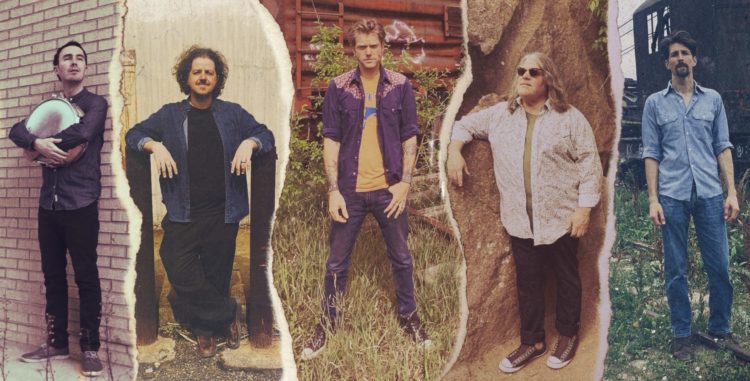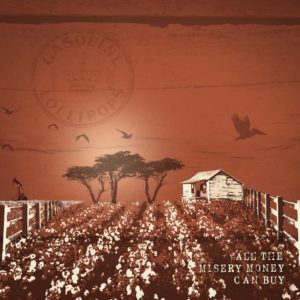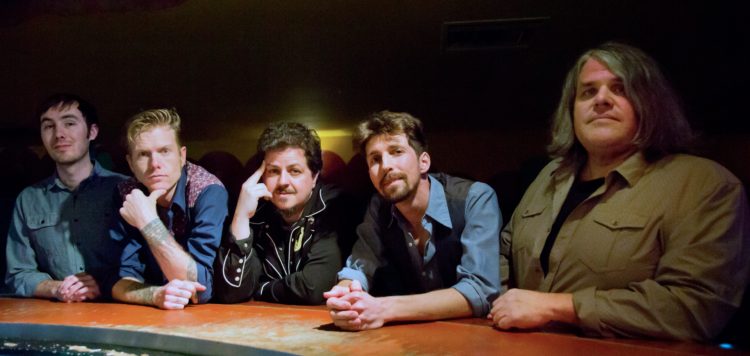
It’s the perfect album for our times. All The Misery Money Can Buy, released Sept. 11 from Boulder, Colorado-based quintet Gasoline Lollipops, is not a soothing, placating, sublime distraction and tonal tonic for the hard time we are enduring.
Instead it is a bold, direct, unashamed, unwavering commentary on those hard times, and a plea for attention and action coming directly from the heart, soul, mind and spirit of the band’s founder and chief songwriter, Clay Rose, and the group of talented and committed musicians he has surrounded himself with in the band.
It is not preachy, nor strident, it does not belittle or resort to sloganeering, but rather explores topics such as climate change, political corruption and economic unfairness through poetic storytelling, evocative language and haltingly compelling imagery.
The current lineup of Gasoline Lollipops was only solidified in the last couple of years. Besides Rose, who formed the band, and has been with it through every incarnation over the past 13 years, the group is comprised of Don Ambory, Scott Coulter, ‘Bad’ Brad Morse and Kevin Matthews. The new record marks the first time in the history of the band where Rose felt confident enough, and also free enough to bring in his bandmates as collaborators, making for a truly unified artistic vision.
“This would be the sixth album with the name Gasoline Lollipops on it, but it’s really a completely different band. You couldn’t recognize it if you put the first album and this album side by side or listen to them track by track. This is the first album for this lineup, and I decided to open up the process as part of my own creative exploration. It really is a community effort with the rest of the band, and also with my mother [professional country music songwriter Donna Farrar] and a number of other close friends. So, that was interesting, because it was such a collaborative effort and there was a lot more for me to learn. The process certainly helped temper my ego,” Rose said with a chuckle.
“I mean, every time the ego gets smaller, the universe gets bigger, right? I also think it was interesting because everybody in the band, musically, has a different perspective and comes from a different musical background. Al the other band members, other than myself, has graduated with a college degree in music, so they’re all very knowledgeable and come at it from a completely different angle than I do. When they all get to have an influence on the shape of a song, it ends up sounding unlike anything I’ve ever played, and it really gets me out of my comfort zone and out of my wheelhouse and that always keeps me sharp. When I am working on something that’s not fully familiar, I am really paying attention.
“It’s a case where I am always exploring and am just as curious, creatively, as I was when I started the band. I would consider myself to be a restless musician and as a writer. I can’t stay in one place for too long. There’s just too much to explore in the universe of music. A certain thing will catch my fancy and I will move over to it, and I will explore that star system and once I have discovered all of its planets, I move on to the next one. Which means it’s been the bane of my existence – not being able to be really categorized because that’s part of not being able to stay in one solar system. But it sounds like death to me to put out the same kind of record over and over again. I would rather die than do that. The bands that I really stay current with and the ones I really admire are the changelings, the ones that are on a journey. I feel that I am on a journey with the listener, and that keeps me interested.”
Describing the band’s sound as both ‘roots and branches’, Rose has always brought in many of the most potent aspects of the 1990s music, from the proto-punk passion of NOFX, to the gritty, reality based songwriting of the best of the grunge music, to the political bent of bands like Rage Against the Machine and the more politicized hip hop acts of the time.
“We tap into a lot of musical roots and then we see where we can pull them out into our current context. And as we pull one out, it gets watered with all kinds of things. It gets watered with modern pop music maybe; it gets watered with socio-political things that are happening right now. And it all gets pulled through a bit of punk rock because that’s where I spent my teen years and that’s where I really cut my teeth playing live music. I am a product of the 1990s and I won’t pretend that I wasn’t,” Rose said, adding that the purpose behind the album is as an unfiltered last cry, last call for action, for something to be done before it’s too late.
 “I would say it’s looking at the plight of the working class, or the death of the working class perhaps. It’s pretty much extinct at this point, but I am a remnant of it. I was raised by a truck driver and a country songwriter and I have been hand to mouth my whole life. Since I’ve been self supporting, I have just been reaching for the poverty line, even though I have worked my ass off. And, as I see my culture disappearing, I guess it’s an attempt to leave one last mark before we’re gone. It’s one last call to action to see who is left, to see who is with it, to see if we have any significance at all anymore. So, yeah, it’s a call to action for sure, but it goes a little deeper than that. It’s also kind of a portrait or a snapshot – for history’s sake it’s a portrait of the working class in the 21st century. Listen, I have always been pretty unabashed when it comes to speaking our political views, and all the guys are on side with what we’re saying on this album. And, I am beyond caring whose toes I am stepping on at this point. I am tired of mincing my words. I am tired of caring about whose toes I am stepping on when these mother****ers and stomping on my head.”
“I would say it’s looking at the plight of the working class, or the death of the working class perhaps. It’s pretty much extinct at this point, but I am a remnant of it. I was raised by a truck driver and a country songwriter and I have been hand to mouth my whole life. Since I’ve been self supporting, I have just been reaching for the poverty line, even though I have worked my ass off. And, as I see my culture disappearing, I guess it’s an attempt to leave one last mark before we’re gone. It’s one last call to action to see who is left, to see who is with it, to see if we have any significance at all anymore. So, yeah, it’s a call to action for sure, but it goes a little deeper than that. It’s also kind of a portrait or a snapshot – for history’s sake it’s a portrait of the working class in the 21st century. Listen, I have always been pretty unabashed when it comes to speaking our political views, and all the guys are on side with what we’re saying on this album. And, I am beyond caring whose toes I am stepping on at this point. I am tired of mincing my words. I am tired of caring about whose toes I am stepping on when these mother****ers and stomping on my head.”
All The Misery Money Can Buy, the title track, has meaning on a couple of levels, according to Rose.
“It was one of two songs on the album that was a collaboration between everybody who contributed to the record. So, there were a lot of cooks in the kitchen for that one, and the idea behind the song is two-fold. One, is all the misery money can buy, meaning it’s the One Per Cent paying, it’s the One Per Cent who get the money and the 99 per cent who are putting up the misery for it. That’s one meaning,” he said.
“The other meaning is more of a philosophical lean on things, which is that the One Per Cent, I believe, there’s no way to quantify it, but I believe that the One Per Cent is probably the most miserable, on a soul sick kind of level. You have to be that angry and to be that empty that you would shovel that much into the void, that you would shovel 98 per cent of the world’s wealth into your gaping hole. You must be starving for something, so that’s the other meaning. And the more you shovel in, the bigger the hole gets, and you can actually see that, where there doesn’t seem enough to fulfill these people. And I can kind of identify as a recovering drug addict where I know the feeling of putting more and more and more into that void and having the emptiness just keep growing exponentially with each shot, each drink. And I certainly don’t mean to say that the rest of us don’t have that void, we certainly do, it’s just that we can’t afford to feed it like the One Per Cent.”
The issue of unrestrained growth and other human-based causes of climactic and seemingly unstoppable climate change – and how many of those with influence refuse to acknowledge the issue, let alone do anything to mitigate it – was the impetus behind the song Dying Young.
“They say that the Earth is old, but I know that she’s dying young. The first verse is very biographical about me growing up in the mountains here in Colorado. I remember it being late July and ice was coming down the creek and that’s how it was year round up in the mountains – there were snowcaps all year round on the continental divide. There was always snow there, so when we were living down at the base of the mountains, that water was ice cold all year round. It’s not like that anymore,” Rose said.
“I am literally standing outside in East Boulder, Colorado as I am talking to you, looking at those same mountains, and they’re bare, covered in a haze of smoke because of the massive forest fires we’ve been having. It never looked like this when I was a kid. That’s why the first verse is a contrast between what the mountains looked like then, and what they look like now.

“And the second verse is actually a lullaby. The lyrics were from a lullaby that I wrote for my son when he was born, which had a different tune to it and everything. I didn’t like the existing second verse in what became Dying Young and took this lullaby for my son and put it in there. Now it’s pretty f***ing heartbreaking when it’s put in that context, asking him do we have a shot at fixing this, or is this all we’ve got.”
Get Up!, the fifth track on the album is literally the call to action, and not just to those who may fall in line philosophically or politically with the sorts of positions Rose and the Gasoline Lollipops take on social, cultural, political and economic issues. It’s also aimed that those who perhaps need to be shaken out of their cognitive rigidity and unshackle themselves from pure partisanship or deliberate blindness to the facts and at least begin to talk.
“The thesis statement of this whole album is trying to start a dialogue with those exact people, many of whom have been actually voting and lobbying against their own interests for decades. Those are the people I really wrote this album for, and that’s why there’s tender love songs and hopefully songs that can get them to identify with some of the sentiments on a human level,” Rose said.
“For example, the song Nights Are Short, is one that all people can identify with, where you have this dream of something better amidst this sort of crushing weight of reality. I think they can identify with that and I hope these songs kind of lure them in a bit. Hopefully it will act as the sugar that let’s the pill of Get Up! go down. These people are desperate to believe what I was just talking about, having a dream and wanting so badly to believe in it. And like most of us they want a quick fix, or a simple answer to things that are really complicated. None of us want to believe the answer to that dream is, ‘okay, quit your job, go out in the street and build this dream, brick by brick – extract yourself from the corrupt capitalist system and build your own civilization.’
“Nobody wants that at all, especially those that were brought up believing that America is the greatest country ever and that it’s the land of the free and the home of the brave, a place where if you work hard and put your attention to it, you can be anything you want to be. That’s what so many have been brought up to believe and they do not want to let go of that fantasy. That’s heartbreaking to them, the last thing they feel that have is that belief, that fantasy. So, they want to make the system work: they don’t want to abandon it. But then someone comes on the scene and says they’re a renegade and they’re not really affiliated with any party, and they have enough money to do what they want and they don’t have to listen to anybody, and only they know how to fix the system and ‘Make America Great Again,’ to give you back the dream you were told was real when you were a child. Man, people want to believe that, so they vote for that. It’s so interesting that we’re all raised with really deep fear and guilt of going against the beliefs that were taught from the time they were children and for generations going back. There’s this huge utility of fear if you think outside the box and the Church or the government or whoever is able to bend that fear to their will and bend it to sell what they need to sell. It’s the easiest form of manipulation and it’s been tried and true for, what, 10,000 years now?”
Not that Rose or his band has all the answers, but through this collection of song, as he’s stated, he hopes at least get people to talk intelligently – and quickly – about the questions.
For more information about Gasoline Lollipops, the new album, All The Misery Money Can Buy, and any post-pandemic shows, visit www.gasolinelollipops.com, or any of the band’s social media accounts.
- Jim Barber is a veteran award-winning journalist and author based in Napanee, ON, who has been writing about music and musicians for nearly 30 years. Besides his journalistic endeavours, he now works as a communications and marketing specialist. Contact him at jimbarberwritingservices@gmail.com.
SHARE THIS POST:
